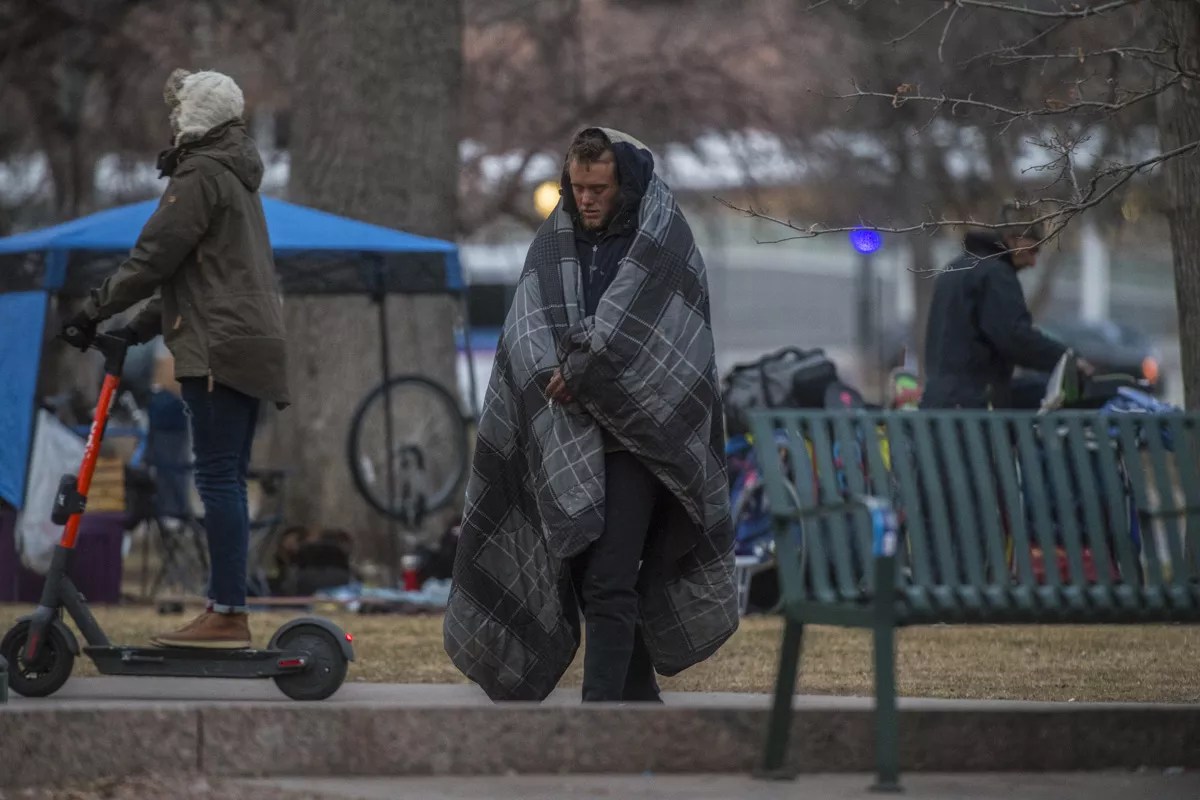
Evan Sem

Audio By Carbonatix
In the weeks after a Denver judge declared the city’s camping ban to be unconstitutional, state lawmakers Adrienne Benavidez and Jovan Melton felt inspired.
“Representative Melton and I did more research and realized that that made sense,” Representative Benavidez, a Commerce City Democrat, says of the ruling by now-retired Judge Johnny Barajas.
In response, the two lawmakers wrote a bill that used much of what Barajas wrote in his December 2019 Denver County Court dismissal of a case involving a homeless man who had been ticketed under the city’s controversial camping ban, which prohibits individuals from using a tent or sleeping bag as shelter from the elements.
The bill the two proposed sought to weaken camping bans across the state, on the grounds that it would be cruel and unusual for a municipality to prevent someone from sheltering outside, unless that municipality already offered adequate shelter. The bill also suggested that people must be allowed to sleep in their cars, as long as those vehicles are legally parked on public property or parked on private property with permission from an owner.
This year, make your gift count –
Invest in local news that matters.
Our work is funded by readers like you who make voluntary gifts because they value our work and want to see it continue. Make a contribution today to help us reach our $50,000 goal!
Benavidez and Melton thought that they would get support from fellow Democrats in the House, since the bill was really only trying to codify in state law the 8th Amendment rights prohibiting cruel and unusual punishment that Barajas had cited.
“It’s a really simple and easy bill,” Melton said during a February 26 House Transportation and Local Government Committee hearing.
But it turned out that the bill, titled “Basic Life Functions in Public Spaces,” wasn’t an easy one for most of the Democrats and all of the Republicans on the committee; the bill was killed by an 8-3 vote.
One Democrat representative who voted no questioned whether it made sense to pass the bill without increasing state funding for homelessness services. “I represent Sheridan. Sheridan is the poorest city in Colorado. It was once the fourth-poorest city in America,” said Representative Meg Froelich. “This bill doesn’t help, in my opinion.”
Benavidez agreed with concerns about the lack of funding statewide, noting that the bill wouldn’t address the systemic issues of homelessness across Colorado. But for the sponsors, that wasn’t the point of their proposals. “This bill is about constitutional rights,” Benavidez told the committee.
Even though there may be enough beds in shelters, that doesn’t mean that everyone has adequate access to them, bill supporters pointed out, echoing an argument in Barajas’s ruling.
“We know that in many communities, shelter is either not an option or unavailable. It’s in this environment that people are often forced to survive outside,” said Cathy Alderman of the Colorado Coalition for the Homeless. “It’s unjust to criminalize, penalize, and make survival impossible for people experiencing homelessness.”
But the arguments weren’t enough to overcome the opposition.
Although this bill failed, Denver’s controversial law remains on life support.
After Judge Barajas declared the camping ban unconstitutional, the Denver Police Department stopped enforcing the ordinance in December. More visible camps started to spring up across the city, including right out front of the Capitol in Lincoln Park. But in January, that camp was cleaned out after Denver declared it a public health hazard, and the DPD began enforcing the ban again in other areas. The department had legal cover to do so, since the city is appealing the judge’s ruling. That makes the law still valid unless and until the city’s appeal is rejected.
After a thorough cleaning that involved removing two dead trees where rats had taken cover, Lincoln Park is about to reopen to the public; technically, it’s state property, so outside of Denver’s camping ban in any case.
The appeal process on Barajas’s decision is likely to take months to run its course. In the meantime, Denver City Councilwoman Candi CdeBaca is trying to put together a coalition of councilmembers to pass an ordinance that would repeal the camping ban altogether. She’ll need a total of nine “yes” votes to override an inevitable veto from Mayor Michael Hancock, whose administration pushed for the camping ban when it was enacted in 2012.